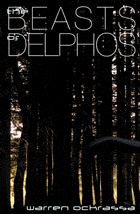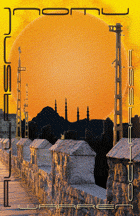 This
month, The Independent Gay
Writer is pleased to continue Jak Klinikowski’s 3 part
interview with author and publisher Warren Ockrassa. In this
issue Ockrassa discusses the sexual issues of his books, THE BEAST OF DELPHOS (BofD) and ALLASU NOMU (A.N.). This
month, The Independent Gay
Writer is pleased to continue Jak Klinikowski’s 3 part
interview with author and publisher Warren Ockrassa. In this
issue Ockrassa discusses the sexual issues of his books, THE BEAST OF DELPHOS (BofD) and ALLASU NOMU (A.N.). |

| Jak:
Please discuss the themes of sexual attraction and love in BofD and
A.N., and how they relate to gender. Do you see gender as an issue in
your work? Gender? Yeah, it's an issue to the extent that men and women are wired differently. Part of the mechanics, part of the biology. Men see sex differently; it's not as big a deal because there aren't as many risks associated with it. It's the women that get pregnant, after all. So naturally there are differences and there are issues. In both BofD and A.N. I had societies that had some pretty definite rules regarding women; on Delphos the women were largely voiceless and powerless. On Allahu'akhbar there's a much more egalitarian structure, which as much as anything else makes it pretty obvious that I'm dealing with a post-reformation Islam. It's another area where I feel like I'm walking some careful lines. I don't want anyone getting the impression that I'm misogynistic, but I do have to sometimes … all right, Delphos is a good example of this. It's a slave planet, and the women are treated even more abominably than the men. I think that's another example of correlation. A society that is oppressive, suppressive, homophobic even, is likely to maltreat women. I don't know why that is, but it sure as hell seems to be a more or less constant theme in human history. So in order to have this really broken social system on Delphos, in order to make the slavery believable, I had to have the women oppressed even more. The extent they got it was disproportionate, but the reason for that becomes clear in another title entirely (A Fire in Arcadia, volume I of which is currently available; the second part will be out later this year), wherein we get the history of Delphos as it existed long before it was a slave world. What happened then, I think, makes the Delphos presented in BofD considerably more sensible. On both Delphos and Allahu'akhbar the genders are pretty sharply segregated in many ways. Most Delphan slaves live their entire lives never seeing a woman; on Allahu'akhbar the kids, particularly, are kept separated, and there's gender separation in the worship as well. For Allahu'akhbar this is reasonable because there's a general belief that men — and particularly pubescent boys — really don't have much sexual self-control and are likely to try to get away with whatever they can. Even the courtships are chaperoned. On Delphos the reasoning is much more practical; slaves wouldn't be as productive if they burned off all their energies having sex all the time, and there are breeding programs designed to control whose stock gets passed along. There are mutt slaves, of course, but there are also lines of superior merit, and the freemen wouldn't want some slave of questionable breeding history to copulate with a woman whose womb has produced only purebred offspring. So on both worlds there's a subtext, an assumption that mixed-gender intercourse is the preferred mode, and that males are pretty much incessantly on the prowl for it. Delphan male slaves, of course, turn to one another for their affections; men on Allahu'akhbar are permitted "the touch" with one another outside of marriage. So there is also recognition that you can't simply cut off the sex drive. It has to express and it has to do it in some way or other that both the participants and society can accept. Delphan freemen don't care about what their males get up to together any more than it's illegal on Allahu'akhbar for men to marry men. (The same is true for women, of course.) In some regards the system on Allahu'akhbar is considerably more evolved than that in our own "free" society, even though it's a theocracy. Of course we learn that there are some trades that have to be made, and they're not very positive trades either. As for attraction, on Delphos we see that a well-made male form is prized, and pretty much everyone is well-made. A lifetime of physical labor will do that. Muscular carriage means a kind of honesty, almost a sense of camaraderie. This is so because the freemen are generally indolent. Fat, probably, lazy and surely much softer — most of them — than those whom they possess. So a Delphan slave would feel more comfortable with a male body that was toned, trim and so on. What happens at one point in the story, though, is one of the slaves has an opportunity to discover the differences among genders. He likes being with women, finds that there are contrasts but that the differences, as foreign as they are to him at first, are compelling and interesting. He's still much happier with male paramours, but he doesn't hate being intimate with women either. He never really gets much of a chance to get to know women, but what little contact he has sets him thinking in ways that prove to be very dangerous — he becomes convinced that women have minds, that they can think. That's as close to a Delphan heresy as any slave can come without actually committing a physical act of resistance, a kind of revolt of the mind. On Allahu'akhbar the tradition is that the first marriage or two a man or woman undertakes will be to someone a little older and a little more experienced, and it's not unusual for first-time husbands to marry other men rather than women. This helps introduce them gently to sexual intimacy; men and women, after all, are built differently, and it's considered appropriate for a new husband to be shown how to be a considerate mate by someone with whom he has more in common physically. Attraction's absolutely a factor, but there are also marriages of convenience or necessity — settling — just as today. The reason those kinds of arrangements are much more tolerable on Allahu'akhbar is, of course, that any marriage need last only one year. If the mates decide to split ways afterward they are allowed to do so, and may even court other prospects while still married in the weeks before the marriage festival. Love is always a touchy spot because everyone has his or her own ideas about what it is, but to me there's a distinction between the kind that draws you initially to someone else and the kind that creates long-term partnerships. Those first rushes of hormones and horniness tend to wear off after a while and if there isn't a solid foundation of affection and trust, your relationship will end, with varying degrees of shouting and dish-throwing, depending on how many times words such as "forever" and "always" wafted on the air in earlier months. Delphans respond to this in different ways; there's no marriage, so they don't have year-long or lifelong commitments. Some choose a bondsman — a kind of squire — who is also an object of special, intense affection, while others sort of float around and have a lot of sex with a lot of different partners. Either mode is acceptable and it's really up to the individual to choose the way he's comfortable with. And you don't have to stick with one or the other forever; you can have a bondsman and allow others intimacy as well, and there's some discovery with some of the characters that a kind of group arrangement is not just satisfactory but what they all want most. On both worlds there's an ethic (which is of course an echo of my own) that a long-term type relationship, while it's an ideal, is not necessarily going to be hit upon. And it's almost never going to happen with your very first sex partner. So there's a kind of encouragement to play the field, to get involved with various mates of both genders and once you've had some experience, begin thinking about something more permanent. Experience and age will let you make more clear-headed decisions and you'll have very realistic expectations about what makes a good partnership. Shakespeare really fouled up England and the US with the romantic twaddle he wrote about star-cross'd lovers and such. There is simply no way that you'll find a love of your life by eyes meeting across a room or something equally foolish, and under no circumstances should high school sweethearts be allowed to marry. This moronic notion that we have that "fate" or anything else "conspires" to bring people together is just so much prettified justification for a loin-centric drive. After all the flowers have withered, after the cake's in the freezer and the birds have choked on the rice, you and your mate get to settle in to … what, half a century of each other? That's when reality and clarity set in, and it wouldn't be a problem if we weren't so asinine about "lifetime" this or that, or especially about cudgeling couples into it when they're barely out of their teens. (Or earlier.) Those ideas come through very clearly in different ways in both BofD and A.N. Characters articulate them (using their own idioms), and their lives embody them. Obviously I believe that's a much more realistic view of how human relationships should be seen, and what's funny about it is I saw that even in my own early twenties, when I was supposed to be falling into the very traps I deride. I guess I got lucky there. Jak: On a personal level, I was left with the impression that these books take a hostile attitude towards anal sex. How do you respond to this? Initially with some surprise. There's a scene in BofD which I know can be troubling to some because it appears to cast anal sex in a negative light in the mind of one of the characters, but I had other reasons for doing what I did at that point which I'll go into a little later. There's also a particularly disturbing event that happens — it's witnessed by another one of the characters and it's pretty violent, pretty messy. The reaction of the witness is to be horrified that something pleasant (sex) could be so entirely abused. Those two sequences might give the impression that I don't like anal sex, particularly since I don't go into lengthy descriptions of lovemaking that includes anal intercourse, but I simply hadn't thought it necessary. Never crossed my mind to think of balancing anything, because I didn't think there was anything to balance. The assault scene in BofD, for instance, is of the same order as what happens in the prison in A.N., and that was another sequence I didn't feel it necessary to balance, because it was a prison rape. I think most readers would understand that I understand that prison rape is not at all like anal sex any more than vaginal rape is like heterosexual intercourse. So I didn't attempt to offset that either; though in A.N. we do get a hint that there's been anal sex — positive and pleasant — but it's not actually described. While it might be possible to interpret that as a negative slant, I believe that's an extreme assessment to make. There's also a very vicious fight sequence that happens in that prison that is not offset by extensive explorations of the positive ways people can touch, after all (hug, caress, etc.), and I think that's reasonable. I know that rape is not sex, and I wouldn't do any reader the disservice of suggesting that the assault sequences are in any way normal or desirable to the victims. (That's an obnoxious thing for any writer to do, describing how a rape victim suddenly starts liking it — I believe if an author thinks that's really plausible, he should go out and get raped a few times to see just how realistic his notions are.) Because of that I just was not writing those passages with the idea of anal-sex defamation in mind; I wasn't thinking I should attempt to offset them with other scenes that show loving penetrative contact for the same kind of reason that I wouldn't offset a knife murder with a demonstration of the many ways vegetables can be productively sliced in the kitchen. Misuse of something doesn't require showing its positive aspects; generally I think most people understand that in describing a rape one is not denigrating sex, but rather showing that the rapist is a bastard. Given, too, that I've got other books out there, and more in the works, which do show anal sex as a positive and loving expression of affection, I'd say that while perhaps I was a little inattentive of the concerns that some might have, it's all right for me to respond by saying the suggestion that I don't like anal sex is not fair. (And I've got several old boyfriends who'd back me up on that too. Uh, so to speak.) Jak: Due to the youthful nature of the majority of your characters, do you think it possible that some readers might accuse you of crossing the line in terms of pedophilic fantasy, and if so, how would you respond these readers? It's something I've been aware of since, of course, I'm still very much the product of my culture, and that happens to include a heightened sensitivity to those kinds of concerns. To the extent that worries about molestation are valid, I don't see anything wrong with being troubled; for instance I think we can all feel a little ashamed that we permitted priests to rape boys, for decades (actually centuries), without doing anything substantial about it until comparatively recently. Conversely there's such a thing as being too uptight, particularly where fiction is concerned. I prefer character driven plots, which means my characters really have to be interesting. They have to be energetic, passionate, and willing and able to change in the scope of a narrative. This essentially requires using characters young enough to go through all that but old enough to be accessible to adults. That doesn't usually happen with very old characters and, when it does, it smacks of the impossible; witness Dickens's A Christmas Carol. Hence I tend to cast a lot of teens, and because I don't really believe in self-Bowdlerization, that also means I have to explore everything they experience. What I find so compelling about teen characters is the extraordinary mix of emotions and the amazing bravado they have. They feel everything so richly, so intensely, and as far as they're concerned it's the first time anyone in the universe has ever had any of those feelings. And their comparative lack of life experience means they can't always sort out or name all those emotions, and they're not sure how to handle them — I think that's a very powerful, poignant and striking combination of traits for a character, a way to have access to extraordinary beauty, tremendous heartbreak and stunning tragedy. Most adults would be able to read something like that and remember all of it from their own lives, every moment, when all those things were brand new and larger than the entire cosmos. But because I don't close many doors, and because we're dealing with lust-laden hormone factories, yeah, there's going to be some sex. I try to play it coy when I'm concerned about crossing too many lines, because I do not want to write kiddie porn (though there's some question whether sex between two teenagers would qualify as "kiddie" anything). The sex that the characters have is a part of their lives, and I suppose that if I were to write page after page of lush, explicit descriptions of smooth this and small that I would either be relating a man having sex with a woman or I would be delving into a pedophilic exploration. That's not what happens in these stories though. But I do recognize that some might worry about the apparently promiscuous and ready sex that goes on in these books, and there are a few places where I've pulled back; one example would be the passage that gave you trouble in BofD, where Barris is pretty clear that he's not interested in sexual contact with a couple of underlings. The point of that passage was not to cast aspersions on anal sex; it was to reassure the reader that Barris, a mature young man, was not sexually drawn to the boys attending him. I didn't want readers dreading a turn of the page and discovering Barris — the hero, for Fred's sake — involved in a threesome with a couple of prepubescent youths. So I had to make it clear that he wasn't interested in them, and I also chose, from time to time, to emphasize how exhausted he always was when he was anywhere near those kids; the message was meant to be that even if he had wanted to, he wouldn't have been able to. What's a little off-center about such worries is that there are so many other things that go wrong in these characters' lives. To obsess about a pair of boys having fun rubbing a few bits together while completely ignoring the massive injustice of the fact that they are slaves is to me the height of perversity of perspective. With A.N. I took it in a slightly different direction. I really do think that we're probably a little overzealous in prosecuting certain types of actions. For some reason we have the magic number 18 stuck in our heads, as though everything that happens before then is done in the innocence of childhood, while everything after that is undertaken in the clarity and wisdom of adulthood. Well, that notion would make sense but for a few minor quibbles, not the least being that it's utter bullshit. Maturity is reached by fits and starts, earned really, not automatically awarded 6,574 days after your birth. We like 18 because it's the age at which legal contracts can be entered, but the last time I checked sex wasn't a business deal. (Events in certain parts of Nevada excluded.) Many, many other nations and cultures don't have that kind of mindset; and in many parts of this country it's acceptable — well, legal anyway — for girls under 18 to marry and, presumably, consummate the marriage. And then, of course, there's the fact that we'll often try kids under 18 as adults, and we are known to occasionally condemn to death those whom we label children. So apparently kids are innocent unless adults decide they're not, which is disingenuous, or they aren't allowed to have sex unless adults marry them, which is hypocritical. There's also the subtext that any sex that happens before the age of 18 is automatically damaging. That definitely is a cultural artifact; our definitions of "harmful" are really what do the damage. So I wanted to try to get past that a little. For a European mind this wouldn't even be necessary, but in the US and UK, it's a must. I deliberately kept things vague with A.N. regarding the age of characters; I ballpark it but from two different timekeeping systems, the Delphan season and the year on Allahu'akhbar, which is longer than a season; and a season is longer than a terrestrial year. Thus there's no easy way to know how old anyone is terrestrially, and I wanted to get away from that because to me the story was about the value and legitimacy of the relationship in spite of those kinds of concerns. That made it much more genuine to me, and it's important because of the way that book wraps up. The relationship had to be about the person, not about simple corporeal considerations. I actually did have one reader suggest that I was all but describing an act of child molestation, which meant to me that I'd played it about right. There are contextual cues to indicate that everyone's of age, and the events in question take place after a legitimate marriage ceremony, so everything is legal by the standards applied on that world. It still makes some readers uneasy, I'm sure, but I'd ask them to ask themselves why. That's really my response to those who might suggest I'm writing some kind of voyeuristic kiddie porn. Why would you think that? Where in the stories do you get that impression? At what point do I go into lavish details describing the rape of a child by an adult, and try to make it look like a good thing? I think such fears betray an ambivalence about sex, sexuality and the nature of youth; that is, they say little about the stories but quite a lot about those asking the questions. Please join us next month for our conclusion of Mr. Ockrassa’s interview. |
 Warren Ockrassa writer/publisher  |
